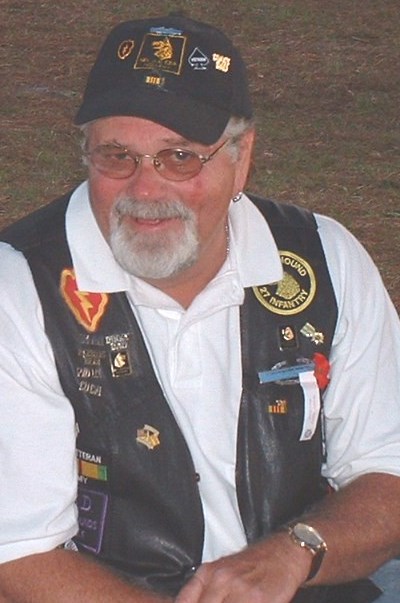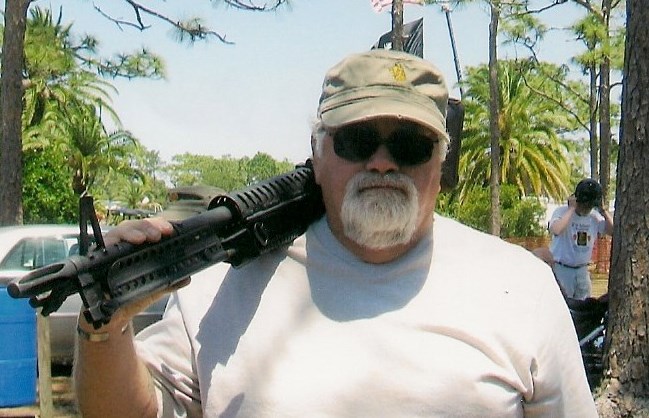Charlie Ragan, Vietnam
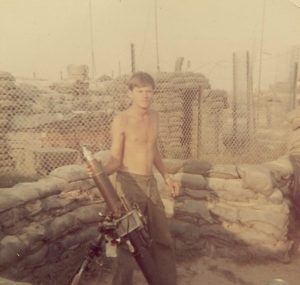 1969
1969
“I’ve been weary of coming here for years. It was a horrible thing.” You can sense the reality in Charley Ragan’s words as he begins to recount his story. He has never been able to tell of his experiences before, except in the company of his family and other vets. For the people that have never fought in battle, we can never understand. That’s the importance of stories like Charlie’s. When you hear Charlie, and men like him, speak it brings this sense of reality that no textbook or video could ever hope to convey.
Charles Herman Ragan was born on September 16, 1949 in Tampa, Florida. He left school after 8 th grade to start working and he eventually joined a carnival. He traveled up and down the east coast until he was 19. When he came home he found his draft notice. He had never thought much about the war, or even paid attention to it until then. He received his basic training at Fort Jackson, South Carolina and thirty days after completing this training, he was in Vietnam.
He landed in Vietnam to hostile rocket and mortar fire. He was scared all the time, but nights were the worst because the North Vietnamese attacked the base camp every night. He felt safer in the bush than at camp. “I worried about death mostly at night. What saved you and made you feel good was when mail call came. I shared my care packages from my wife with my buddies.” They rarely got to shower in Vietnam unless they made it to a larger, better-protected base camp like Chu Chi, DaNang, or Saigon.
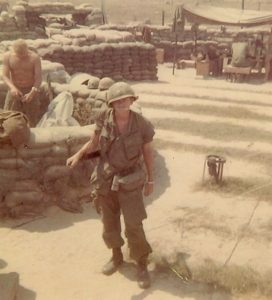 Charlie had several jobs in Vietnam with Alpha Company, 2 nd Battalion, 27 th Infantry Regiment (Wolf Hounds), 25 th Infantry Division. He was a light infantry soldier and at varying times carried the 81 mm mortars or an M-60 machine gun. He was also a tunnel rat, which entailed climbing into tunnels armed with a .45 and a bayonet. He re-enlisted for a second tour of duty because he needed the $3000 dollars it paid. In this tour, he was stationed in a supply line and was supposed to be away from most of the action but he was sent to Tay Ninh, which had Viet Cong surrounding his base camp at the bottom of the mountain! He received the National Defense Service Medal, Vietnam Service Medal, Vietnam Campaign Medal, Combat Infantryman Badge, Army Commendation Medal, Sharpshooter, and a Good Conduct Medal. While on an ambush, his unit was attacked and four of the six men in his unit were killed. He got himself and the other man out alive. The military tried to award him a Purple Heart, but he turned them down because his brothers didn’t make it back.
Charlie had several jobs in Vietnam with Alpha Company, 2 nd Battalion, 27 th Infantry Regiment (Wolf Hounds), 25 th Infantry Division. He was a light infantry soldier and at varying times carried the 81 mm mortars or an M-60 machine gun. He was also a tunnel rat, which entailed climbing into tunnels armed with a .45 and a bayonet. He re-enlisted for a second tour of duty because he needed the $3000 dollars it paid. In this tour, he was stationed in a supply line and was supposed to be away from most of the action but he was sent to Tay Ninh, which had Viet Cong surrounding his base camp at the bottom of the mountain! He received the National Defense Service Medal, Vietnam Service Medal, Vietnam Campaign Medal, Combat Infantryman Badge, Army Commendation Medal, Sharpshooter, and a Good Conduct Medal. While on an ambush, his unit was attacked and four of the six men in his unit were killed. He got himself and the other man out alive. The military tried to award him a Purple Heart, but he turned them down because his brothers didn’t make it back.
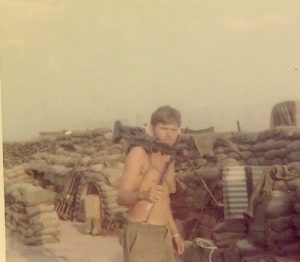 His main mission as an infantryman was setting up ambushes. To do this, they would go through the jungle and find the purposed ambush site, and then they would pass it and come back and set up the ambush at night so the North Vietnamese couldn’t see it. One night they missed the ambush site and set up in the wrong place. It was a trail and that night the enemy set off the ambush. Charlie made everyone take cover, while he manned the machine gun and cut everything down. “You’re scared to death. Your first thought is survival. That’s what you do--you survive. They were looking for us; they were going to kill us. It was dark and you couldn’t see your hand in front of you face. If you lit a cigarette in the jungle it could be seen for a mile away. You’ve got thousands of mosquitoes and leeches biting all over you. We heard the trip flares go off. We had claymore mines, but we didn’t do that because they were to close and we would have gotten some of the recoil back on us, so I just opened up with a machine gun. We killed three and captured two. The next day we interrogated them and they told us where the cache was and where they were set up.”
His main mission as an infantryman was setting up ambushes. To do this, they would go through the jungle and find the purposed ambush site, and then they would pass it and come back and set up the ambush at night so the North Vietnamese couldn’t see it. One night they missed the ambush site and set up in the wrong place. It was a trail and that night the enemy set off the ambush. Charlie made everyone take cover, while he manned the machine gun and cut everything down. “You’re scared to death. Your first thought is survival. That’s what you do--you survive. They were looking for us; they were going to kill us. It was dark and you couldn’t see your hand in front of you face. If you lit a cigarette in the jungle it could be seen for a mile away. You’ve got thousands of mosquitoes and leeches biting all over you. We heard the trip flares go off. We had claymore mines, but we didn’t do that because they were to close and we would have gotten some of the recoil back on us, so I just opened up with a machine gun. We killed three and captured two. The next day we interrogated them and they told us where the cache was and where they were set up.”
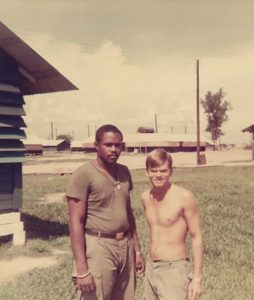 The South Vietnamese were basically good people, especially the elderly. The ARVN’s were good people but were known to fall asleep on watch. None of them could be trusted. The North Vietnamese were very evil people. “They tortured, butchered and mutilated our soldiers. They would send children to the soldiers on bicycles with cigarettes and cokes for sell. When the soldiers got close they would blow themselves and as many soldiers as possible up with grenades.”
The South Vietnamese were basically good people, especially the elderly. The ARVN’s were good people but were known to fall asleep on watch. None of them could be trusted. The North Vietnamese were very evil people. “They tortured, butchered and mutilated our soldiers. They would send children to the soldiers on bicycles with cigarettes and cokes for sell. When the soldiers got close they would blow themselves and as many soldiers as possible up with grenades.”
“When we were coming back from Vietnam we landed in Alaska and then took another flight to Oakland, California. Before we got to Oakland, one of the sergeants told us if anybody had civilian clothes, you better put ‘em on because they’re gonna be spittin’ and cussin’ at us; and that’s exactly what they did. They cussed at us and called us baby killers. When I first got home my wife had to sit on me because I thought she was the enemy. I was trying to kill her.” When he came back he requested to be stationed at Fort Jackson because that’s the Fort he knew from his basic training. He was a brigade guard there for one year and six months and left the military in June 1973. Charlie has had trouble holding jobs since then, having 36 up until 2001 when he was placed on full disability due to Post Traumatic Stress Disorder (PTSD). Charlie suffers from post traumatic stress disorder and tinnitus. The post traumatic stress disorder is from the whole war experience and not just any one thing. He suffers from nightmares, and the 4 th of July is also very hard because the explosions bring back the memories. Recently, Charlie was involved in a car wreck and that has triggered a bad flare up. His therapist helps him to control his temper, but anything can set him off. Tinnitus is a constant ringing in the ears that he says came from artillery that was close to his bunk at base camp. “They don’t warn you when they fire those things and when you’re under fire if you stop to put in earplugs you are dead”. Charlie also suffers from symptoms of Agent Orange.
“I don’t think we should have been there. We could have won the war but it was political; they wouldn’t let us do our job. I compare Iraq to Vietnam now. They won’t let you go in and do your job. Those guys turn a corner, and they get shot at with a rocket launcher, but then all the people look the same and they blend into the crowd. You always have to remember that in combat, little Iraqis grow up to be big Iraqis as the little Viet Cong grow up to be big ones. It wasn’t a nice war. I wouldn’t want to go back, but when this Iraq thing started there was a bunch of us at the Vet center that wanted to volunteer; but I’m 54 and too old. War shouldn’t be a televised thing because the televised part is spruced up. They make a big mockery of the war. They put more into it than what there really was. It’s all political.”
Of all his horrible experiences in Vietnam, seeing his buddies killed is one of his strongest memories. “I saw my best friend killed because he struck his head up too high. The smell of rotting bodies was unforgettable. You never forget it. I still see shadows. There is always something there.” We can never forget what happened in Vietnam and it is our responsibility to keep these stories alive so this will never have to happen again.
Presented by: Robbie Osenton, Writer and Tyler Rubley
